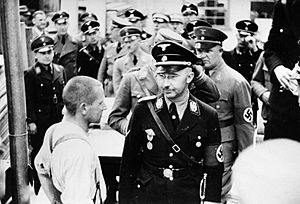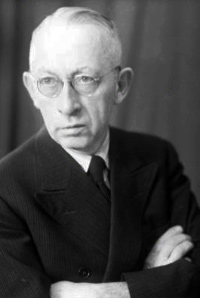Hans Eppinger facts for kids
Hans Eppinger Jr. (born January 5, 1879, in Prague, Austria-Hungary – died September 25, 1946, in Vienna) was an Austrian doctor. He is known for his medical research, especially about the liver. However, he also performed very harmful experiments on people held in Nazi concentration camps during World War II.
Contents
Early Life and Medical Career
Hans Eppinger Jr. was born in Prague. His father, Hans Eppinger Sr., was also a doctor. Hans Jr. studied medicine in Graz and Strasbourg. In 1903, he became a medical doctor in Graz. Later, in 1908, he moved to Vienna.
By 1909, he became a specialist in internal medicine, focusing on problems with the liver. He became a professor in 1918. He then taught medicine in Freiburg in 1926 and in Cologne in 1930. He was a well-known doctor and even traveled to Moscow in 1936 to treat Joseph Stalin. A year later, he treated Queen Marie of Romania.
Eppinger joined the Nazi Party in 1937. His home was even used by Nazi student groups at the University of Vienna. Many of his assistants were also part of Nazi groups.
Unethical Experiments During World War II

During World War II, Hans Eppinger Jr. became known for his cruel experiments on prisoners at Dachau concentration camp. Along with another professor, he conducted tests on 90 Romani prisoners. In these tests, the prisoners were given only sea water to drink. Sometimes, the taste of the salt water was hidden.
The goal of these experiments was to see how long it would take for the prisoners to become very sick or die from severe dehydration. Witnesses said that the prisoners suffered greatly. They were so thirsty that they tried to drink water from the floors they had just mopped.
Medical Terms and Legacy
Some medical terms were once named after Eppinger:
- Cauchois-Eppinger-Frugoni syndrome (now called portal vein thrombosis)
- Eppinger's spider naevus (now called Spider Angioma)
For a while, a special award called the Eppinger Prize was given for important work in liver research. However, in 1984, when people learned about Eppinger's experiments at Dachau, the prize was stopped.
Also, a lunar crater on the Moon was named 'Euclides D' in his honor in 1976. But in 2002, after his connection to the Nazi prison camps became widely known, the name was removed. The crater is now officially called Euclides D again.
See also
- List of medical eponyms with Nazi associations
 | Jackie Robinson |
 | Jack Johnson |
 | Althea Gibson |
 | Arthur Ashe |
 | Muhammad Ali |


